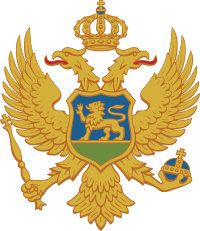Montenegrin Argentine
Argentine Montenegrins are people born in Argentina of Montenegrin descent. During the early 1900s, Montenegrins from the Kingdom of Montenegro began emigrating to the country, and nowadays there are approximately 50,000 Montenegrins and descendants living in Argentina. Besides Poles (450,000) and Croatians (440,000) they are one of the most populous Slavic communities in Argentina. Currently most of them are located in the northern province of Chaco, while the remaining part lives in Buenos Aires, Tandil, Venado Tuerto, and General Madariaga, a town of around 5,000 inhabitants.
| Part of a series on |
| Montenegrins |
|---|
 |
| By region or country |
| Recognized populations |
|
Montenegro Serbia Bosnia and Herzegovina Croatia North Macedonia Kosovo Albania |
| Diaspora |
|
Europe · Austria · Denmark France · Germany Italy · Luxembourg Russia · Slovenia Sweden · Switzerland United Kingdom |
|
North America United States · Canada · Mexico |
|
South America Argentina · Chile Bolivia · Brazil · Colombia |
|
Oceania Australia · New Zealand |
| Culture |
|
Literature · Music · Art · Cinema Cuisine · Dress · Sport |
| Religion |
|
Catholicism Islam |
| Language and dialects |
| Montenegrin · Serbian |
| History |
|
History of Montenegro Rulers |
| Total population | |
|---|---|
| 50,000 (2014)[1] | |
| Regions with significant populations | |
| Chaco, Buenos Aires, Tandil, Venado Tuerto | |
| Languages | |
| Montenegrin | |
| Religion | |
| Montenegrin Orthodox, Roman Catholic and Muslim | |
| Related ethnic groups | |
| Montenegrins, Montenegrin Australians |
Descendants of ethnic Montenegrins established Colonia La Montenegrina, the largest Montenegrin colony in South America, in which they are part of even today. General Madariaga is a specially important place for Montegrins in Argentina since many of them have achieved a remarkable wealth there through the business of cattle breeding, and most Montenegrins and their descendants are buried in its cemetery. Additionally, the Montenegrin-Argentine organization, Yugoslav Society Njegoš (Sociedad Yugoslava Njegoš, previously called the Montenegrin Society and Montenegrin-Yugoslav Society for Mutual Aid before World War II) provides mutual aid inside the town.
Notable individuals
- Jorge Capitanich, politician, former senator and current governor of the Chaco Province
- Emilio Ogñénovich, Roman Catholic bishop of the Roman Catholic Archdiocese of Mercedes-Luján, Argentina
- Esteban Saveljich, football player
- Gastón Bojanich, football player
- Nicolás Vuyovich, sportscar driver
References
- "Širom svijeta pola miliona Crnogoraca". Rtcg.me. Retrieved 2 January 2018.